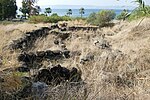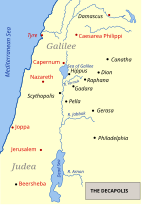Al-Nuqayb
Arab villages depopulated during the 1948 Arab–Israeli WarDistrict of TiberiasPages with non-numeric formatnum arguments

Al-Nuqayb was a Palestinian Arab village in the Tiberias Subdistrict. It was depopulated during the 1948 Arab-Israeli War on May 15, 1948. It was located 10 km east across the lake from Tiberias. bordering the Wadi al-Muzaffar and Wadi Samakh. al-Nuqayb was named after the Bedouin tribe of 'Arab al-Nuqayb.
Excerpt from the Wikipedia article Al-Nuqayb (License: CC BY-SA 3.0, Authors, Images).Al-Nuqayb
92, Emek HaYarden Regional Council
Geographical coordinates (GPS) Address Nearby Places Show on map
Geographical coordinates (GPS)
| Latitude | Longitude |
|---|---|
| N 32.799166666667 ° | E 35.640277777778 ° |
Address
92
Emek HaYarden Regional Council
North District, Israel
Open on Google Maps







